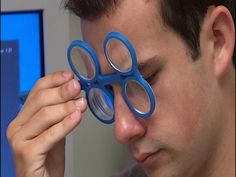
What is Vision Therapy?
When and Why is it Needed? Vision therapy is a doctor-supervised (behavioral optometrist), non-surgical and customized program of visual activities designed to correct certain vision problems and/or improve visual skills. It is like physical therapy for the eyes, teaching you
Read more
Vision Therapy for Adults
Vision Therapy is often more effective for adults because they are usually more motivated to improve their visual abilities, whereas children may not understand that they have a problem or how that problem may affect their interests or future. Vision
Read more
Eye Exercises
Vision Therapy is designed specifically for the individual, a supervised treatment program to correct visual-motor and/or perceptual-cognitive deficiencies. Vision Therapy sessions include procedures designed to enhance the brain’s ability to control: eye alignment, eye tracking and eye teaming, eye focusing
Read moreWhat is Vision Therapy? When and Why is it Needed?
Vision Therapy is physical training for your eyes and brain which can serve as an alternative to surgical methods to correct a number of health issues.
For the eyes, vision therapy can help to fix eye and vision related problems such as lazy eyes, cross eyes, double vision and convergence insufficiency. It can also help alleviate reading problems and learning disabilities related to eye health and coordination.
In terms of learning disabilities, vision therapy can help aid the problems that come with reading, learning and educational instruction.
Vision Therapy is not to be confused with eye exercises, however. Vision therapy is done under the supervision of a doctor and consists of a progressive series of exercises and procedures. Unlike eye exercises which tend to be set programs with specific moves, vision therapy is personalized to suit each person’s needs. This will depend on their condition and the severity of it.
The procedures are usually catered to improve their visual comfort and ease and alter how a patient interprets visual information. It can also aid in developing or improving basic visual skills and abilities.
Vision Therapy sessions are usually conducted in thirty minutes to an hour appointment times in weekly sessions.
The need for vision therapy is assessed after a check up by a qualified vision care professional and will sometimes incorporate the use of eye based medical equipment. The medical equipment that is sometimes used is corrective lenses, prism lenses, balance boards and optical filters.
The brain has the ability to adapt to vision related advantages as well as disadvantages. Those who may suffer from a lack of coordination with their vision or lazy eyes will know that these problems can take a while to become noticeable because the brain trains itself to cope with the imbalance. On the other hand, vision therapy can teach the brain to adapt to better eye health and therefore deliver an effective solution to the problem.
Probably the biggest determiner of if and when vision therapy is needed is when glasses or lenses do not seem to be doing the job. Glasses and lenses are commonly prescribed for a wide range of eye conditions but they do not always correct them. They may help to lessen the problem for a little while, but ultimately they are not a cure.
Also, if learning difficulties are the issue, vision therapy can be more effective than any other kind of remedy offered by health professionals. Vision therapy can potentially fix any problems that come with vision or reading-related learning difficulties. With vision therapy, you may find that school performance is permanently improved and enhanced as long as there is an effective solution to the problem. This is more likely to happen with the use of vision therapy.
Vision Therapy can also potentially correct some of the symptoms and learning difficulties experienced in children with dyslexia, ADD and those who are simply described as unmotivated to learn. When these cases arise, vision therapy can be a potential route to go down to fix the condition as it can sometimes be a result of the poor vision and eye health. When these problems and concerns arise with your children, as well as seeing your usual healthcare professional, you may want to consider seeing an eye specialist who offers vision therapy as well.
Vision Therapy is needed because it can serve as a long-term solution to many long term conditions. It can prove to be more effective than traditional methods of curing eye related ailments. The way that this is done incorporates a retraining and a strengthening of the eyes and vision, which then retrains the way the eyes work and ultimately the way the brain works.
It is also beneficial for those who do not wish to undergo surgery. People have many reasons for not wanting to go down the route of surgery, which can be health or psychologically related and for these people surgery is not a viable option. Instead of going for a series of sessions that can be proven to show the same or similar results can be a more promising option.
Vision Therapy does not promise to completely remove the need for glasses but it can be used as an alternative. For more serious conditions, traditional remedies may still be relied upon but vision therapy will always provide effective results. It can make the condition better overall and is an easy, non-intrusive way of fixing a large number of health issues.
